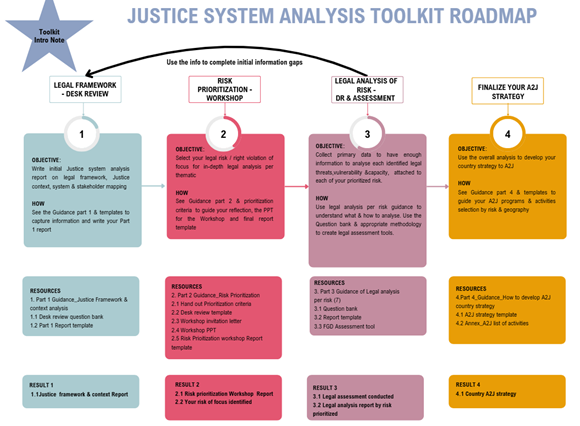GPC Operations Cell: gpc[at]unhcr.org
Gender-Based Violence: chase[at]unfpa.org
Child Protection: rpouwels[at]unicef.org
Housing, Land and Property: jim.robinson[at]nrc.no
Mine Action: unmasgeneva[at]un.org
Without access to justice, protection risks intensify, social tensions escalate into unresolved conflicts, and cycles of impunity, powerlessness, and injustice are perpetuated. However, in times of crisis, justice services are often overlooked, despite being essential for addressing rights violations and providing recourse for survivors of violence. Justice programming is frequently treated as a development issue or a highly specialized, sensitive area. In contexts characterized by widespread rights abuses, humanitarian actors often perceive existing justice system as irrelevant—or even harmful—to survivors, reinforcing discrimination, inequality, and violence. Even when accessing justice is considered within humanitarian responses, there is often a bias in engagement, with stakeholders favoring formal justice and excluding informal mechanisms (such as traditional, customary, or religious courts). Yet, these informal mechanisms often prove more resilient in crises and are frequently preferred by affected communities.
Limited investment in that area of programing and services in humanitarian settings has led to significant gaps in operational methodologies for delivering responsive and effective legal protection as part of response to crisis. Humanitarian protection actors have consistently called for clearer guidance and practical tools to support legal programming in emergencies—tools that recognize the importance of justice as a core component of protection and resilience.
The Justice System Analysis Toolkit, developed by the International Rescue Committee (IRC) with the support of the Swedish International Development Cooperation Agency (SIDA), is a resource designed to support humanitarian organizations with dedicated legal personnel in enhancing access to justice for crisis-affected populations. This toolkit is built into 4 parts: (i) general justice system analysis; (ii) identify and prioritize the main rights violations in your context; (iii) initiate an in-depth legal analysis of each prioritized risk to, ultimately (iv) build your context-specific A2J strategy. The toolkits provide an operational approach to drive a foundational understanding of the justice landscape in each context.
At the heart of the Justice Analysis Toolkit is a focus on capturing voices of the most excluded social groups in context to understand the risks they face and their needs as justice services users to inform the development of transformative actionable access to justice and legal empowerment strategies. The Toolkit recognizes that in-depth analysis of justice systems, inclusive of formal and informal justice systems, normative frameworks, stakeholders and their practices, is foundational to design and implement A2J strategies and programming that respond to lived realities, priorities and needs of people served. This analysis is an essential first step for shaping any legal programing including informing the legal content and focus of community paralegal programs.
To access the entire toolkit, please click here
